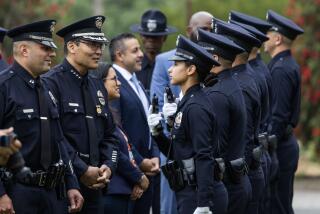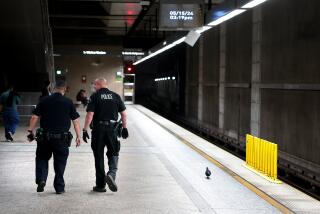Pounding the Beat : Police: Chief Willie L. Williams and Deputy Mayor William C. Violante present their case to Capitol lawmakers in an effort to secure federal funds for more officers to patrol L.A. streets.
WASHINGTON — Los Angeles Police Chief Willie L. Williams and Deputy Mayor William C. Violante encountered optimism--and realism--in their quest Tuesday to line up federal funds to rebuild the shrinking L.A. police force.
During a daylong series of meetings with California congress members, senators and Atty. Gen Janet Reno, the two officials made their pitch that Los Angeles should be at the front of the line when federal funds are allocated for more police on U.S. streets.
And while Williams and Violante seemed generally pleased with the success of their visit, they will return to Los Angeles with no commitments that the federal funds are secure.
Williams, who has made this sort of Washington journey many times before as Philadelphia’s top cop, was not surprised.
“I’ve never walked away with a check on the first trip,” he said after a half-hour meeting with Reno.
Mayor Richard Riordan, who has made public safety his highest priority, has promised to hire 3,000 additional police for a force that has lost 700 officers over the last several years. Williams and Violante hope to patch together $27 million to $30 million from various federal sources to pay the salaries of at least 100 new police officers for four years.
Congress already has allocated $150 million for a Justice Assistance Program, and Violante and Williams hope to persuade Reno and others that the formula for distributing that money should be favorable to big cities that face special problems.
Realistically, said Los Angeles’ Washington lobbyist, James F. Seeley, the city may be able to get only $5 million or $6 million from the program.
Nonetheless, Violante emerged upbeat from the meeting with Reno, saying it “went very well.”
Williams said Reno was open to the idea that guidelines for doling out the money be written so the money is not spread too thinly across the country.
Reno was willing to consider the L.A. recommendations, said Williams, “as long as we can provide the data . . . to justify them.”
Earlier in the day, the Los Angles emissaries visited both of California’s Democratic senators.
Sen. Dianne Feinstein cautioned that obtaining the money would be difficult and chided city voters for defeating two bond issues that would have helped pay for more police.
She said that earmarking federal money for more police officers was complicated “because it requires a continuous source of funding.”
But Feinstein held out hope that a federal crime bill will provide additional funds for more police.
Feinstein also fired off a letter Tuesday to Reno backing up the pleas of Williams and Violante, pointing out that “Los Angeles’ ‘thin blue line’ is by far the thinnest of any major city in the nation, with one officer for every 457 residents.” New York and Chicago have police staffing levels almost twice as high, Feinstein wrote.
Sen. Barbara Boxer praised the “excellent unity” displayed by California government officials in seeking the federal funds and rated the city’s chance of success as good.
Williams and Violante also stopped by the offices of Reps. Xavier Becerra (D-Los Angeles), Howard L. Berman (D-Panorama City), Julian C. Dixon (D-Los Angeles) and Carlos J. Moorhead (R-Glendale) to discuss strategies for obtaining the funds. The city officials were also planning to meet with Rep. Steve Horn (R-Long Beach).
More to Read
Sign up for Essential California
The most important California stories and recommendations in your inbox every morning.
You may occasionally receive promotional content from the Los Angeles Times.










